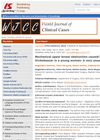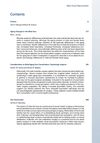 July 2021 in “Journal of dermatology research and therapy”
July 2021 in “Journal of dermatology research and therapy” COVID-19 may worsen hair loss, and Nourkrin® could be a safe treatment option, but more research is needed.
 July 2022 in “Nigerian journal of medicine : journal of the National Association of Resident Doctors of Nigeria”
July 2022 in “Nigerian journal of medicine : journal of the National Association of Resident Doctors of Nigeria” Androgenetic Alopecia (AGA) greatly lowers quality of life, causing stress and low self-esteem, with those seeking treatment experiencing more impairment.
January 2022 in “Aesthetic surgery journal” Extracellular vesicles may effectively treat hair loss with minimal side effects.
October 2015 in “Vestnik dermatologii i venerologii” Alopecia significantly harms emotional and social well-being.
 May 2017 in “Journal of The American Academy of Dermatology”
May 2017 in “Journal of The American Academy of Dermatology” Certain factors like patchy hair loss at the back of the head, being female, and younger age at diagnosis can lead to a worse outcome for alopecia areata.
 1 citations,
December 2010 in “InnovAiT”
1 citations,
December 2010 in “InnovAiT” The document concludes that accurate diagnosis and appropriate management are crucial for treating various hair disorders, which have significant psychological impacts.
 December 2022 in “Scholars journal of applied medical sciences”
December 2022 in “Scholars journal of applied medical sciences” Dutasteride 0.5mg improves hair growth in 78% of people with hair loss, but may cause sexual problems in some.
18 citations,
September 2021 in “Journal of Neuroendocrinology” Neurosteroids can influence behavior by modulating brain inhibition, with potential for treating psychiatric disorders.
19 citations,
March 1999 in “PubMed” Trichotillomania is a chronic condition where people uncontrollably pull out their hair, often starting in childhood.
35 citations,
December 2009 in “Lupus” Anti-Ro exposed children had more reported neuro-psychiatric issues, but differences from healthy controls were not significant.
 26 citations,
September 2009 in “Psychosomatics”
26 citations,
September 2009 in “Psychosomatics” A girl initially thought to have a psychiatric disorder was later found to have a lupus-related condition, which improved with proper treatment.
15 citations,
April 2008 in “Headache” People with migraines often have mental health conditions, and treatment should be personalized to address both issues safely.
 35 citations,
August 2004 in “Epilepsy & behavior”
35 citations,
August 2004 in “Epilepsy & behavior” Extended-release divalproex is better tolerated and more effective for seizures and psychiatric symptoms than delayed-release divalproex, but doesn't reduce hair loss.
 18 citations,
June 2019 in “Twin research and human genetics”
18 citations,
June 2019 in “Twin research and human genetics” The 25Up study collected extensive data on mental disorders and related factors in Australian twins and siblings to investigate the genetics of psychiatric illnesses.
 February 2024 in “BioMetals”
February 2024 in “BioMetals” Heavy metals like arsenic, cadmium, and lead can increase cancer risk and worsen outcomes.
 39 citations,
October 2015 in “Case Reports”
39 citations,
October 2015 in “Case Reports” Some people experience severe, long-lasting side effects from fluoroquinolone antibiotics, leading to the recommendation of limited use and increased awareness of these risks.
 15 citations,
May 2017 in “JEADV. Journal of the European Academy of Dermatology and Venereology/Journal of the European Academy of Dermatology and Venereology”
15 citations,
May 2017 in “JEADV. Journal of the European Academy of Dermatology and Venereology/Journal of the European Academy of Dermatology and Venereology” High-dose corticosteroids and methotrexate had a modest effect on severe childhood alopecia, but side effects and relapse were concerns.
 April 2024 in “International journal of impotence research”
April 2024 in “International journal of impotence research” Some men experience persistent sexual, neurological, and psychological symptoms after stopping finasteride, but evidence of permanent damage is inconclusive.
 February 2024 in “World journal of clinical cases”
February 2024 in “World journal of clinical cases” A young woman had surgery to remove a large hairball that blocked her intestines and then got psychiatric help.
 475 citations,
January 2016 in “International Review of Psychiatry”
475 citations,
January 2016 in “International Review of Psychiatry” The document concludes that non-binary individuals need compassionate support and recognition in healthcare, without being pathologized.
 18 citations,
March 2020 in “Frontiers in Neuroendocrinology”
18 citations,
March 2020 in “Frontiers in Neuroendocrinology” The enzymes 5α-reductase and 3α/β-hydroxysteroid oxidoreductase help create brain-active substances from progesterone and testosterone, which could be used for treatment, but more research is needed to ensure their safety and effectiveness.
 60 citations,
May 2018 in “Indian Journal of Psychological Medicine”
60 citations,
May 2018 in “Indian Journal of Psychological Medicine” Women with PCOS often experience anxiety, depression, and a lower quality of life.
 50 citations,
March 2000 in “American Journal of Clinical Dermatology”
50 citations,
March 2000 in “American Journal of Clinical Dermatology” Alopecia Areata has no guaranteed treatment for hair regrowth, but options like corticosteroids and minoxidil are used, with future research focusing on genetic and immune therapies.
 27 citations,
March 1994 in “Harvard Review of Psychiatry”
27 citations,
March 1994 in “Harvard Review of Psychiatry” Behavior therapy and medications, especially clomipramine, can help reduce hair pulling in people with trichotillomania.
 25 citations,
January 2015 in “Advances in Psychosomatic Medicine”
25 citations,
January 2015 in “Advances in Psychosomatic Medicine” Many skin patients also have mental health issues, and doctors should treat both together.
 8 citations,
August 2018 in “International Journal of Dermatology”
8 citations,
August 2018 in “International Journal of Dermatology” The document concludes that doctors should carefully consider off-label drug use in dermatology and always inform patients, while more research is needed on the safety and effectiveness of such practices.
 July 2008 in “Facial Plastic Surgery Clinics of North America”
July 2008 in “Facial Plastic Surgery Clinics of North America” Men's facial rejuvenation involves unique challenges and is increasingly popular, with many opting for nonsurgical treatments.
 November 1999 in “Australian Psychologist”
November 1999 in “Australian Psychologist” The reviews highlighted practical advice and insights from various psychology and therapy books.
 198 citations,
July 2011 in “Cochrane library”
198 citations,
July 2011 in “Cochrane library” Lifestyle changes can improve body composition, excess male hormone levels, and insulin resistance in women with PCOS.
 177 citations,
July 2004 in “The Journal of Sexual Medicine”
177 citations,
July 2004 in “The Journal of Sexual Medicine” Experts recommend thorough medical, sexual, and psychosocial assessments for women's sexual dysfunctions, and suggest individualized treatment plans with regular check-ups. They also mention potential use of estrogen and androgen therapy, but with caution due to safety concerns.























